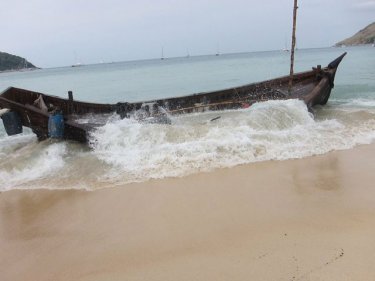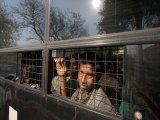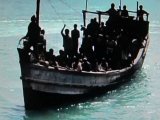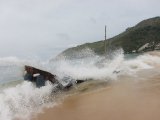PHUKET: Public exposure of the large number of Rohingya boatpeople being apprehended or ''helped on'' in Thai waters has been welcomed by a key non-government agency.
Colonel Manat Kongpan, head of Thailand's Internal Security Operations Command, Fourth Region, based in Ranong, said this week that the Muslim minority Rohingya were now coming from Burma in larger groups, with totals similar lately to the record ''sailing season'' of 2008-2009 when almost 5000 boatpeople came ashore north and south of Phuket.
This sailing season, because of a change in tactics, about 2500 boatpeople had been arrested while a similar number have been apprehended at sea and ''helped on'' - given food and water and told to keep going, past Thailand.
Chris Lewa, of the Arakan Project, said Colonel Manat's figures were similar to the estimates by the NGO based on information from Rohingya sources.
From 1225 in 2006, the figure of arrested boatpeople in Thailand rose to 2763 in 2007 then 4886 in 2008, and 1477 in 2009, falling to 93 in 2010 and 351 in 2011, Colonel Manat's figures show.
The fall-off in 2010 and 2011 is generally attributed to the Rohingya waiting in hope to see whether the new ''democratic'' government in Burma would grant them citizenship and end persecution.
With clear messages sent that the persecution will continue, the Rohingya have returned in large numbers this sailing season to making risky voyages south towards Muslim-majority Malaysia in barely seaworthy vessels.
Efforts to stem the numbers of boats sailing from Burma and Bangladesh, where many Rohingya live as refugees, have failed. Punishment also does not seem to be a deterrent.
Ms Lewa said that it appeared the most recent boatpeople arrested in Malaysia had been sentenced to five months in jail where the previous sentences had been two or three months.
Desperation was growing and more boatpeople were also leaving from departure points further to the south in Burma, she said. It's believed that Thai people-smugglers have also recently become involved in the trafficking process.
Colonel Manat said Isoc had been working with as many as 17 different agencies to apprehend or ''help on'' Rohingya boatpeople. Local village networks had been established along the Andaman coast to look out for boats and alert authorities.
The Rohingya sailings, first detected in 1998, were a threat to Thailand's security and every effort would be made to stop them, he said. The Royal Thai Navy and Marine Police assist with arrests and in ''helping on'' boats.
With the safe sailing season between November and April now drawing to a close, governments around the region are expected to again discuss political solutions to the Rohingya sailings.
Even in the new ''democratic'' Burma, acceptance of the Rohingya as citizens seems unlikely. If no solution can be found, more boats than ever can be expected next sailing season.
Colonel Manat Kongpan, head of Thailand's Internal Security Operations Command, Fourth Region, based in Ranong, said this week that the Muslim minority Rohingya were now coming from Burma in larger groups, with totals similar lately to the record ''sailing season'' of 2008-2009 when almost 5000 boatpeople came ashore north and south of Phuket.
This sailing season, because of a change in tactics, about 2500 boatpeople had been arrested while a similar number have been apprehended at sea and ''helped on'' - given food and water and told to keep going, past Thailand.
Chris Lewa, of the Arakan Project, said Colonel Manat's figures were similar to the estimates by the NGO based on information from Rohingya sources.
From 1225 in 2006, the figure of arrested boatpeople in Thailand rose to 2763 in 2007 then 4886 in 2008, and 1477 in 2009, falling to 93 in 2010 and 351 in 2011, Colonel Manat's figures show.
The fall-off in 2010 and 2011 is generally attributed to the Rohingya waiting in hope to see whether the new ''democratic'' government in Burma would grant them citizenship and end persecution.
With clear messages sent that the persecution will continue, the Rohingya have returned in large numbers this sailing season to making risky voyages south towards Muslim-majority Malaysia in barely seaworthy vessels.
Efforts to stem the numbers of boats sailing from Burma and Bangladesh, where many Rohingya live as refugees, have failed. Punishment also does not seem to be a deterrent.
Ms Lewa said that it appeared the most recent boatpeople arrested in Malaysia had been sentenced to five months in jail where the previous sentences had been two or three months.
Desperation was growing and more boatpeople were also leaving from departure points further to the south in Burma, she said. It's believed that Thai people-smugglers have also recently become involved in the trafficking process.
Colonel Manat said Isoc had been working with as many as 17 different agencies to apprehend or ''help on'' Rohingya boatpeople. Local village networks had been established along the Andaman coast to look out for boats and alert authorities.
The Rohingya sailings, first detected in 1998, were a threat to Thailand's security and every effort would be made to stop them, he said. The Royal Thai Navy and Marine Police assist with arrests and in ''helping on'' boats.
With the safe sailing season between November and April now drawing to a close, governments around the region are expected to again discuss political solutions to the Rohingya sailings.
Even in the new ''democratic'' Burma, acceptance of the Rohingya as citizens seems unlikely. If no solution can be found, more boats than ever can be expected next sailing season.










